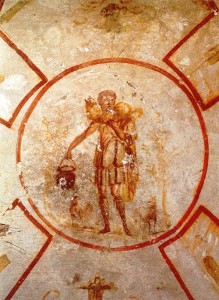 Jer 23:1-6
Jer 23:1-6
Ps 23:1-3, 3-4, 5, 6
Eph 2:13-18
Mk 6:30-34
“The Lord is my shepherd.” The image of Christ as shepherd is one of the earliest—and most common—Christian depictions of Jesus. It is a rich image which is most beautifully fleshed out in our reading from the Psalms. Psalm 23 is by far the most popular of the Psalms, and for good reason. It also can help us understand the significance of the phrase “the Lord is my shepherd” for the moral life.
A shepherd leads the sheep. Sheep need a shepherd because the shepherd directs the sheep to those things necessary to flourish: food, water, shelter. The shepherd also protects the sheep from danger. It is the shepherd who knows what is best for the sheep and also what is harmful. Basically, a sheep really can only flourish, that is, become a good sheep by following the shepherd. Left to its own devices, it probably isn’t going to last for very long. This is why Jesus is moved with pity in our reading from Mark. The people are like sheep without a shepherd. And this is also the reason for God’s anger in our reading from Jeremiah where he denounces the “bad shepherds” who are not caring for the sheep.
Last week, Tom talked about the dynamic between human action and God’s grace, a dynamic we also see in our readings for this week. The shepherd actively directs the sheep, and the sheep flourish by sacrificing their own will to follow the shepherd. True freedom for the sheep and true happiness consists in doing what the good shepherd wills, in choosing to surrender.
A shepherd leads the sheep by directing all of their attention and energy to the good things they need to flourish. Without a shepherd, the sheep are “scattered.” They wander around and end up in lots of different places. The shepherd gives the sheep a focus that they wouldn’t have on their own.
Now we begin to see the moral force of the allegory. Like the sheep, we are prone to be scattered by our diverse passions and energies, often ending up in some pretty dangerous spots. Think of the unbridled ambition of the businessman or woman who fights to make it to the top and still ends up miserable despite fantastic wealth, power, and honor. As shepherd, God directs our passions to what is ultimately conducive to flourishing—union with God himself. “For you are at my side. . . I will dwell in the house of the Lord for years to come.” And this is where the shepherd allegory falls short. The shepherd leads the sheep to external goods that the sheep needs to flourish, but the divine shepherd draws us into an intimate union with himself.
From a Christian perspective the Psalm also has an incarnational dimension. The shepherd becomes the lamb, the lamb who dies for the sheep so that they might have union with the shepherd. This is what our reading from Ephesians makes clear:
In Christ Jesus you who once were far off
have become near by the blood of Christ.
For he is our peace, he who made both one
and broke down the dividing wall of enmity, through his flesh . . .
. . . that he might create in himself one new person in place of the two,
thus establishing peace,
and might reconcile both with God,
in one body, through the cross . . .
Just as Christ became the lamb, our readings call us to become sheep. This is a hard thing to hear in a world that tells us that we are the masters of our destiny, but the paradox for the Christian is that we are only truly the masters of our destiny when we accept that we are not and we surrender to the only one who reign and govern wisely.


